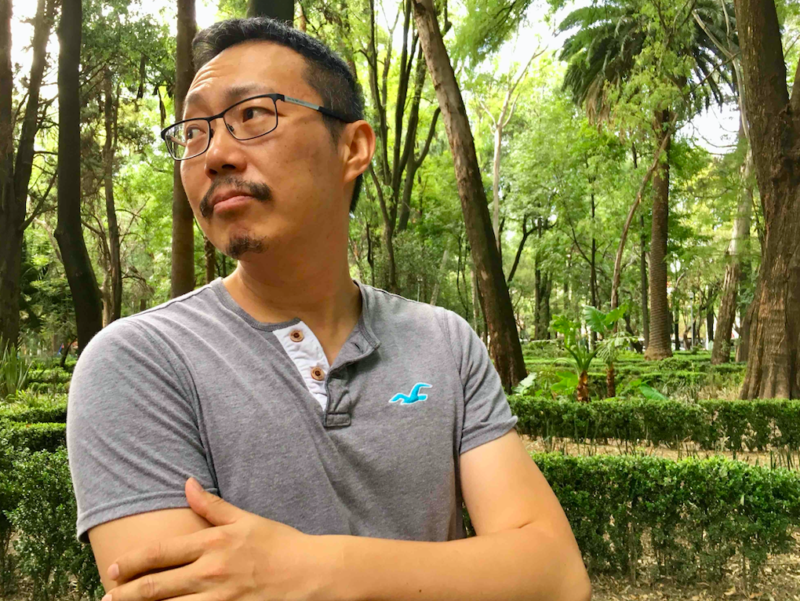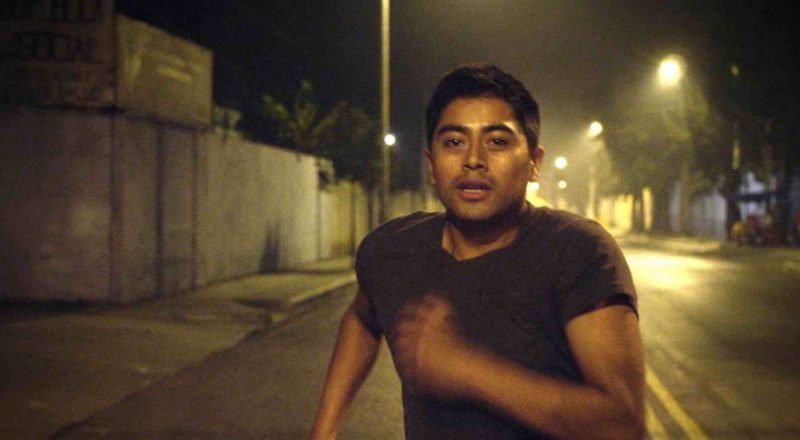INTERVIEW: ‘José’ finds himself (and some unexpected romance) in Guatemala City
Photo: Enrique Salanic stars as the title character in José. Photo courtesy of YQ Studio LLC / Provided by Outsider Pictures press site with permission.
Director Li Cheng’s new feature film is a touching and heartfelt portrait of a young gay man searching for meaning, romance and acceptance on the streets of Guatemala City. José opens today, Jan. 31, at New York City’s Quad Cinema after a successful festival run, including bringing home the Queer Lion Award at the Venice Film Festival.
Enrique Salanic plays the title character, a man who lives home with his mother (Ana Cecilia Mota) and works at a local restaurant in the capital city, according to press notes. He frequents secret sex houses and meets a variety of men he connects with on social media, but these quick encounters don’t help him much with his yearning for romance and his desire to break from the conservatism of the highly Catholic society around him.
That is until José meets Luis (Manolo Herrera). A relationship beings to build, and the two men face a whole new set of questions about their life and their future.
“Back in 2016, my producer and also my longtime collaborator, George [F. Roberson], he and I we decided to leave the U.S. because we feel with the election and everything, there’s a lot of negative energy in the country,” said Cheng, who is originally from China and now a U.S. citizen. “We decided to make a film about love in Latin American countries because I think that’s important to show the image of Latino people, so we basically did very extensive traveling. … We ended up in Guatemala purely by accident. We weren’t planning to go to Guatemala at the beginning of the trip, but once we finished here and there, we felt we were inspired, but not there yet. So let’s keep traveling. Let’s take a look at Central America [and Guatemala] and be there, so one day we flew there. And a week later, we’re like, this is the place. We’ve got to do something here.”
Once they settled on their story of a young gay man facing an upheaval in his life, they started the lengthy and arduous process of casting the movie. The vast majority of actors in José are nonprofessional. Herrera had some prior theatrical experience, and Salanic had attained another principal role the same year he was filming Cheng’s movie. But, for the most part, this was an ensemble new to the world of movie-making.
“The majority of them we found through social media promotion,” the director said. “We described the movie and gave a description and the requirements for the different roles. We had 600 people. We did four casting [sessions] in total. … The first day we got almost 300. We only rented the place for three hours, so everybody got less than five minutes to show their ability. So it was very encouraging, all the young people.”
After the first round of casting, Cheng and his team told a few lucky performers that they had made it to the second round, and he divulged more details about the characters and the themes of the movie.
“Nobody backed out,” he said. “They all came to the second casting. … Some of them are not gay; some people are gay, and there’s no problem because they mingled and mixed together. … We actually had quite a few good choices, good candidates for both roles, and we had to really fight hard and discuss with each other which choice we should make. And I had to make the final choice. It was quite a painful and difficult choice because there were a few of them; they are all very good.”

Cheng, who now lives in Brazil, settled on Salanic in the title role for a number of reasons. First of all, it was quite obvious that the burgeoning actor truly wanted to play this character. The relatively new performer was recommended by a friend of Cheng’s, so he didn’t come to the casting session through the social media callout. Instead the prospective lead and filmmaker chatted on WhatsApp.
“So we talked on WhatsApp a little bit,” he remembers. “[I said], ‘Tomorrow we’re going to see a sound technician, and we’re going to be in this café if you want to come. And we can cast you tomorrow at 9 o’clock.’ He didn’t confirm anything, and at 9 o’clock the next day we got a message: ‘I’m outside the café. ‘Then later we realized that he lived five hours from Guatemala City where the casting is, so actually he had to get up at 3 o’clock in the morning to take a five-hour bus to come here without serious confirmation. So we were a little surprised he was there. We’re like, ‘OK, give us 10 minutes. Here’s the synopsis of the movie. Take a read, and see what you think.’ Then we just realized that he was so excited and … really had this smile, wants to talk and has that desire and passion. We were like, wow, he really wants to be in this movie.”
Cheng, whose first film was 2014’s Joshua Tree, felt that Salanic identified with the character and shared many of the same personality traits. Also, Salanic can speak English, which helped when communicating with Cheng, who cannot speak Spanish fluently.
“He’s a very good English speaker because my Spanish is not that great, so it is a lot easier to work with him since he speaks fluent English,” Cheng said. “The second lead, Manolo, he doesn’t speak any English, so sometimes he’s the middle man to translate for us. So that was very helpful.”
Cheng added: “[Salanic] was 24 years old, but he had background experience like José had in the movie. So he loved, he had loss of love, and those things match. It matches well.”
When watching José one realizes there’s a definite authenticity to the proceedings. This is a film made by someone who knows and understands the local neighborhoods, and the interiors and exteriors are all perfectly chosen to highlight the dramatic and emotional story. For Cheng, this authenticity was key.
“We definitely didn’t want to make a movie that people say, ‘Oh, that’s not Guatemala,'” he said. “We showed some cuts to some of our Guatemalan friends, and they were like, ‘Oh, wow, this is Guatemala, and we actually never saw this part of Guatemala before.’ … So that was very encouraging, and yes authenticity is very, very part of my cinema, my film language. Especially to show some urgency in a contemporary society in Latin America, being authentic is super, super important.”
By John Soltes / Publisher / John@HollywoodSoapbox.com
José, directed by Li Cheng, is currently playing the Quad Cinema in New York City. Click here for more information.

